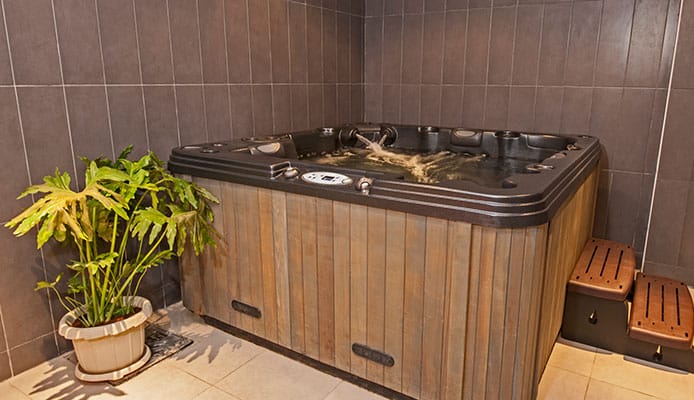
Choosing the right hot tub heater can be an overwhelming task, especially if you are not familiar with its functions and variety. Bear in mind there are two possible choices – gas heaters and electric heaters. Whether you choose to get a gas-heated hot tub or an electric hot tub is totally up to your preference.
Both types of heaters come with advantages as well as disadvantages, so you should take a closer look before the purchase. In this article, we will talk about the difference between gas and electric tub heaters, making it easier to choose the best option.
Gas Heated Hot Tub Heater
These kinds of hot tub heaters are powered by natural gas or propane. They can be used for portable spas but only if they are not installed in the spa cabinet. Also, they are used for wooden hot tubs as well as in-ground spas.
Constant fuel supply is provided by a gas line that is connected to the heater using a gas contractor. Gas tub heaters rely on spark ignition for their power. They are not as widespread as electric heaters, but they have their unique features which can be beneficial to many users, depending on the conditions.
Pros
- Lower Cost. Recently, natural gas has become a more affordable option. Propane, on the other hand, is more expensive, but it provides more BTU’s than the natural gas option.
- Faster Heating Process. Gas heaters are winning in the category of the speed of heating. Using this kind of heater, you can increase the temperature by 1-2 degrees per minute. Using an electric tub heater is a much slower process because it needs an hour to raise the temperature for a few degrees. A gas heated hot tub heater makes it possible to keep the spa at a lower resting temperature.
- More Versatile. Gas heaters can be used for many kinds of hot tubs, such as large ones, wooden spas, or ones with poor insulation.
Cons
- Higher Installation Cost. A gas heater is typically around $1000. Also, it requires a gas line connected to the gas meter or propane tank. The cost will vary depending on the distance between the heater and the meter. In certain situations, the additional cost can be higher than the price of the heater.
- Gas-related accidents. Even though these types of accidents rarely happen, they are still possible. Always check the gas appliances safety and the associated risks, such as carbon monoxide exhaust or even gas leaks.
- Lower Aesthetic Possibility. It is not possible to hide a gas heater under a hot tub. This type of heater has to be in the open air. Clear sky and fresh air are essential for it to operate well because of the exhaust fumes.
You might also like: 2 Person Hot Tubs
Electric Hot Tub Heater

These kinds of hot tub heaters are also called flow-thru heaters. They represent an electric heating element that is placed inside a tube, typically made from stainless steel. The tube is very compact and slim, but the element is easily accessible via union connectors.
It comes with pressure switches and temperature sensors which serve to watch the water flow and monitor the temperature. Electric heaters are the most common type of hot tub heaters. They are easier to install and more aesthetically pleasing, as well as less complicated than gas heaters.
Pros
- Lower Cost. Using an electric hot tub heater is generally less expensive than using a gas heater if you are living in a mild climate. Besides, your tub should have a good hot tub cover, as well as good insulation. However, if your utilities are expensive, electric heaters may not be a better option.
- Lower Installation Cost. Electric tub heaters typically cost less than gas heaters – around $100-$300. Besides, they do not require a gas line so you will also be saving money on that if you decide to go with an electric heater. Usually, they are powered with 240 volts and a 60-amp circuit breaker.
- Low Cost of Repairs. Since electric tub heaters are simple, their repairs do not typically cost more than $100. On the other hand, gas heaters are more complicated, so their repairs are in turn more expensive.
Cons
- Slow Heating. Small and insulated spas heat the quickest, approximately 2-3 degrees per hour. However, if your tub is bigger and the weather is colder, you should be able to add 1 degree per hour. Small heaters may not be able to compete with bigger heaters at all.
- You should not be too worried because accidents rarely happen. Electric heaters are protected by many safe components and GFCI, which prevents electric shock and overheating. However, such accidents are still possible when using 240 volts.
- Possible Higher Costs. Electric heaters can be more expensive to maintain depending on the circumstances. For example, if you are spending more than 25¢ per kW, you will likely spend less with a gas heater. Keeping the water hot is much harder for tubs located in colder climates and for those with poor insulation. Consequently, you will need to spend more money to keep everything running smoothly in such cases.
Heater Comparison
Use
For most users, electric heaters are cheaper as well as simpler, both in the short and long run. On the other hand, those living in regions colder than Southern California may find small gas heaters are a better option. Gas heaters also seem to be a better choice for those who do not plan on using the tub regularly. Small tubs can be maintained at 90 degrees, and heated up to 104 in thirty minutes.
Cost
Cost is a very important element in choosing the best heater option. If you would like to see the difference in cost, bear in mind that it requires 8.34 BTUs to heat one gallon of water one degree Fahrenheit. Also, you should pay attention to heat loss and the size of your hot tub. Heat loss is constant and 2-person hot tubs need more energy to heat up.
FAQ
Q: Do Hot Tubs Need a Gas Line?
Hot tubs need a gas line if they are utilizing gas heated hot tub heaters. Electric hot tub heaters do not require a gas line.
Q: Can You Heat A Hot Tub With Gas?
Yes, you can heat a hot tub with gas using gas hot tub heaters. It can actually be a cheaper option.
Globo Surf Overview
Choosing the right hot tub heater should be based solely on your preference because there is no universal pick. Since both gas heaters and electric heaters have certain pros and cons, it is important to thoroughly analyze and compare their features.
Electric heaters are less complicated but they need more time to raise the temperature. On the other hand, gas heaters have a more complicated and expensive installation, but they can increase the temperature in no time. Generally, electric heaters are better for people living in a warmer climate, while gas heaters are better if you are not a regular tub user.

